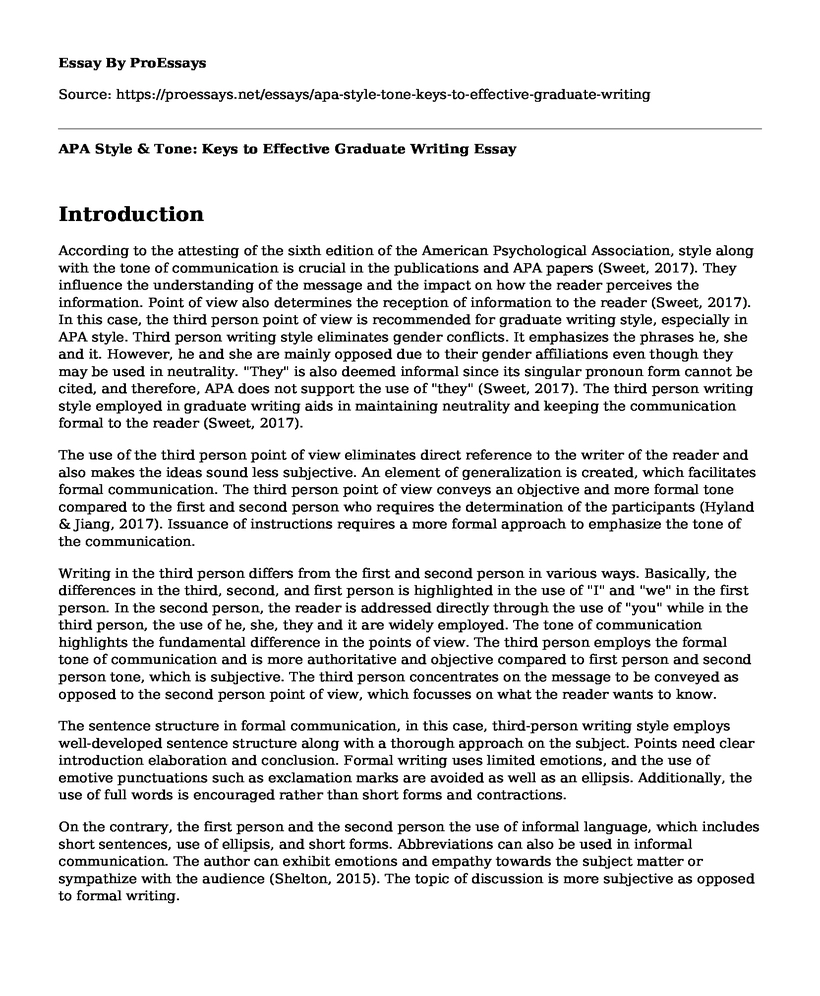Introduction
According to the attesting of the sixth edition of the American Psychological Association, style along with the tone of communication is crucial in the publications and APA papers (Sweet, 2017). They influence the understanding of the message and the impact on how the reader perceives the information. Point of view also determines the reception of information to the reader (Sweet, 2017). In this case, the third person point of view is recommended for graduate writing style, especially in APA style. Third person writing style eliminates gender conflicts. It emphasizes the phrases he, she and it. However, he and she are mainly opposed due to their gender affiliations even though they may be used in neutrality. "They" is also deemed informal since its singular pronoun form cannot be cited, and therefore, APA does not support the use of "they" (Sweet, 2017). The third person writing style employed in graduate writing aids in maintaining neutrality and keeping the communication formal to the reader (Sweet, 2017).
The use of the third person point of view eliminates direct reference to the writer of the reader and also makes the ideas sound less subjective. An element of generalization is created, which facilitates formal communication. The third person point of view conveys an objective and more formal tone compared to the first and second person who requires the determination of the participants (Hyland & Jiang, 2017). Issuance of instructions requires a more formal approach to emphasize the tone of the communication.
Writing in the third person differs from the first and second person in various ways. Basically, the differences in the third, second, and first person is highlighted in the use of "I" and "we" in the first person. In the second person, the reader is addressed directly through the use of "you" while in the third person, the use of he, she, they and it are widely employed. The tone of communication highlights the fundamental difference in the points of view. The third person employs the formal tone of communication and is more authoritative and objective compared to first person and second person tone, which is subjective. The third person concentrates on the message to be conveyed as opposed to the second person point of view, which focusses on what the reader wants to know.
The sentence structure in formal communication, in this case, third-person writing style employs well-developed sentence structure along with a thorough approach on the subject. Points need clear introduction elaboration and conclusion. Formal writing uses limited emotions, and the use of emotive punctuations such as exclamation marks are avoided as well as an ellipsis. Additionally, the use of full words is encouraged rather than short forms and contractions.
On the contrary, the first person and the second person the use of informal language, which includes short sentences, use of ellipsis, and short forms. Abbreviations can also be used in informal communication. The author can exhibit emotions and empathy towards the subject matter or sympathize with the audience (Shelton, 2015). The topic of discussion is more subjective as opposed to formal writing.
Conclusion
In conclusion, the use of third person writing style, especially in APA, is used to foster the tone of communication and ensuring writing is more objective and thoroughly address the subject matter. Vast differences can be cited in the use of a first person, second person, and third person writing style. However, to ensure the objectivity and embrace an official tone of communication, the third-person writing style is recommended in graduate writing, especially in APA style.
References
Hyland, K., & Jiang, F. K. (2017). Is academic writing becoming more informal?. English for Specific Purposes, 45, 40-51.
Shelton, D. C. (2015). Writing in the first person for academic and research publication. In Proceedings of the EDSIG Conference (p. n3487).
Sweet, K. (2017). Writing in Third Person in APA Style. Retrieved from https://penandthepad.com/writing-third-person-apa-style-2056.html
Cite this page
APA Style & Tone: Keys to Effective Graduate Writing. (2023, Jan 16). Retrieved from https://proessays.net/essays/apa-style-tone-keys-to-effective-graduate-writing
If you are the original author of this essay and no longer wish to have it published on the ProEssays website, please click below to request its removal:
- Annotated Bibliography Example on the Print Media Issues
- Essay on Impact of Social Media on College Students
- Affective Publics Essay
- The Role of Jazz in American 1920's Culture Essay
- Pluralism and Inclusiveness in Architecture
- William Branch's Battle With FCC Spotlights Media's Impact on Society - Essay Sample
- Report Sample on Mass Communication on Marginalized Groups







